 "/>
"/>
 "/>
"/>

美國賓夕法尼亞大學(xué)景觀與區(qū)域規(guī)劃教授兼前系主任、著名蘇格蘭景觀設(shè)計師伊恩·麥克哈格(Ian McHarg)教授是全球環(huán)境保護運動最具影響力的一位人物,他于1969年出版的《設(shè)計結(jié)合自然》(Design with Nature)一書開創(chuàng)了生態(tài)規(guī)劃的思想理念,闡述了人與自然不可分割的依存關(guān)系,提出了生態(tài)景觀設(shè)計與可持續(xù)性區(qū)域規(guī)劃的方法,引發(fā)了公眾對于環(huán)境議題的廣泛關(guān)注。
The professor and chair of landscape and regional planning at the University of Pennsylvania in the United States, an illustrious Scottish-American ecologist and landscape architect, Professor Ian McHarg was one of the most influential persons in the global environmental movement. His 1969 book Design with Nature pioneered the concept of ecological planning, elaborated on the inseparable interdependence between humanity and nature, and brought environmental planning methods into the mainstream of landscape architecture, city planning and public policy, and ecological concerns into broad public awareness.
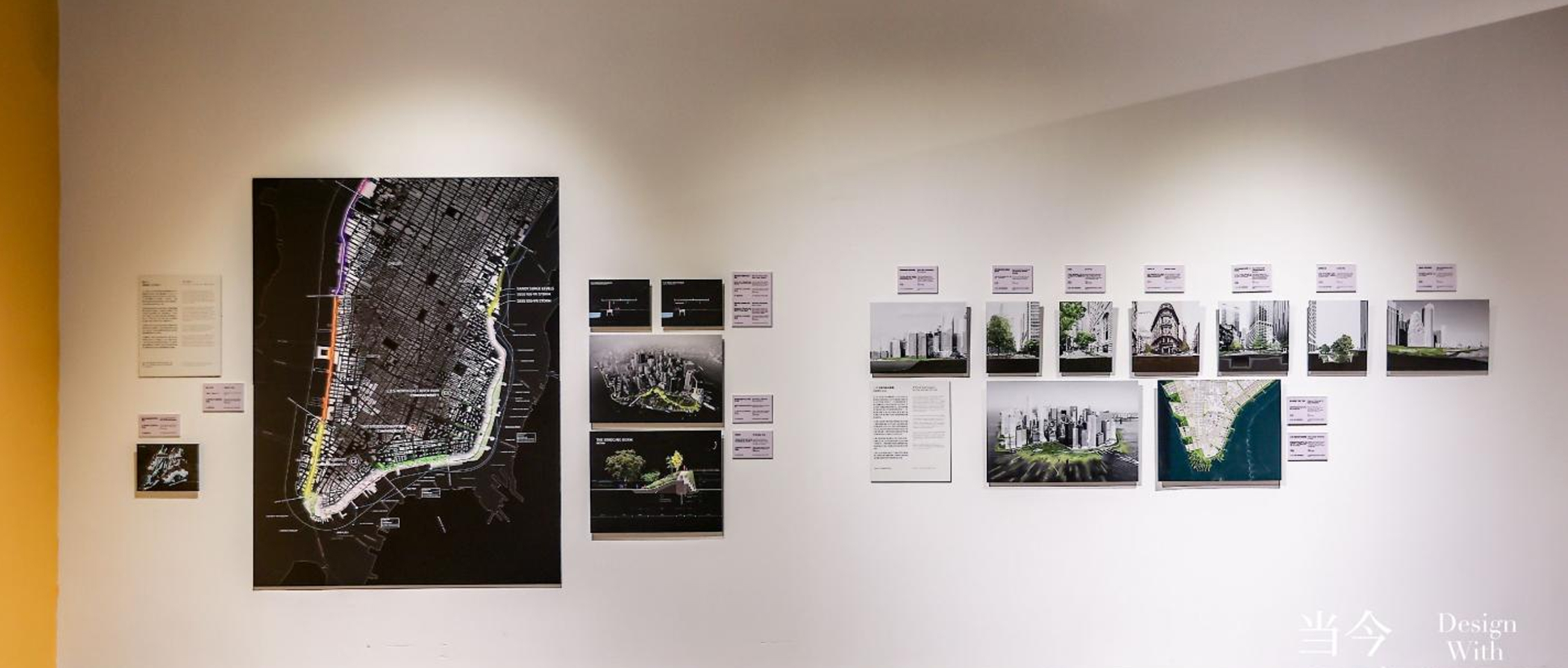

伊恩·麥克哈格
Ian McHarg
賓夕法尼亞大學(xué)建筑檔案館伊恩-L麥克哈格藏品
lan L. McHarg Collection, The Architectural Archives, University of Pennsylvania
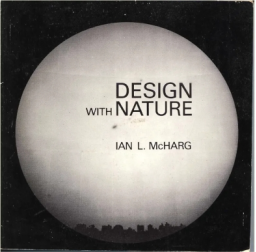
《設(shè)計結(jié)合自然》第一版封面
The Cover of the First Edition of Design with Nature
1969年賓夕法尼亞大學(xué)建筑檔案館伊恩-L麥克哈格藏品
lan L. McHarg Collection, The Architectural Archives, University of Pennsylvania, 1969
為紀念這部具有里程碑意義著作出版55周年,東南大學(xué)建筑學(xué)院與賓夕法尼亞大學(xué)魏茨曼設(shè)計學(xué)院聯(lián)合舉辦“當(dāng)今之設(shè)計結(jié)合自然”(Design with Nature Now)的亞洲巡展·南京首站;并聯(lián)合舉辦了主題為“人工自然——跨越人工與自然的對立”的暑假學(xué)校。
To commemorate the 55th anniversary of the publication of this milestone work, the School of Architecture, Southeast University and the Stuart Weitzman School of Design, University of Pennsylvania jointly organized the "Design with Nature Now" Asia tour, with Nanjing as the first stop. They are also co-hosting a summer school-themed "ARTIFICIAL NATURE: Towards Overcoming the Opposition Between Artifice and Nature."
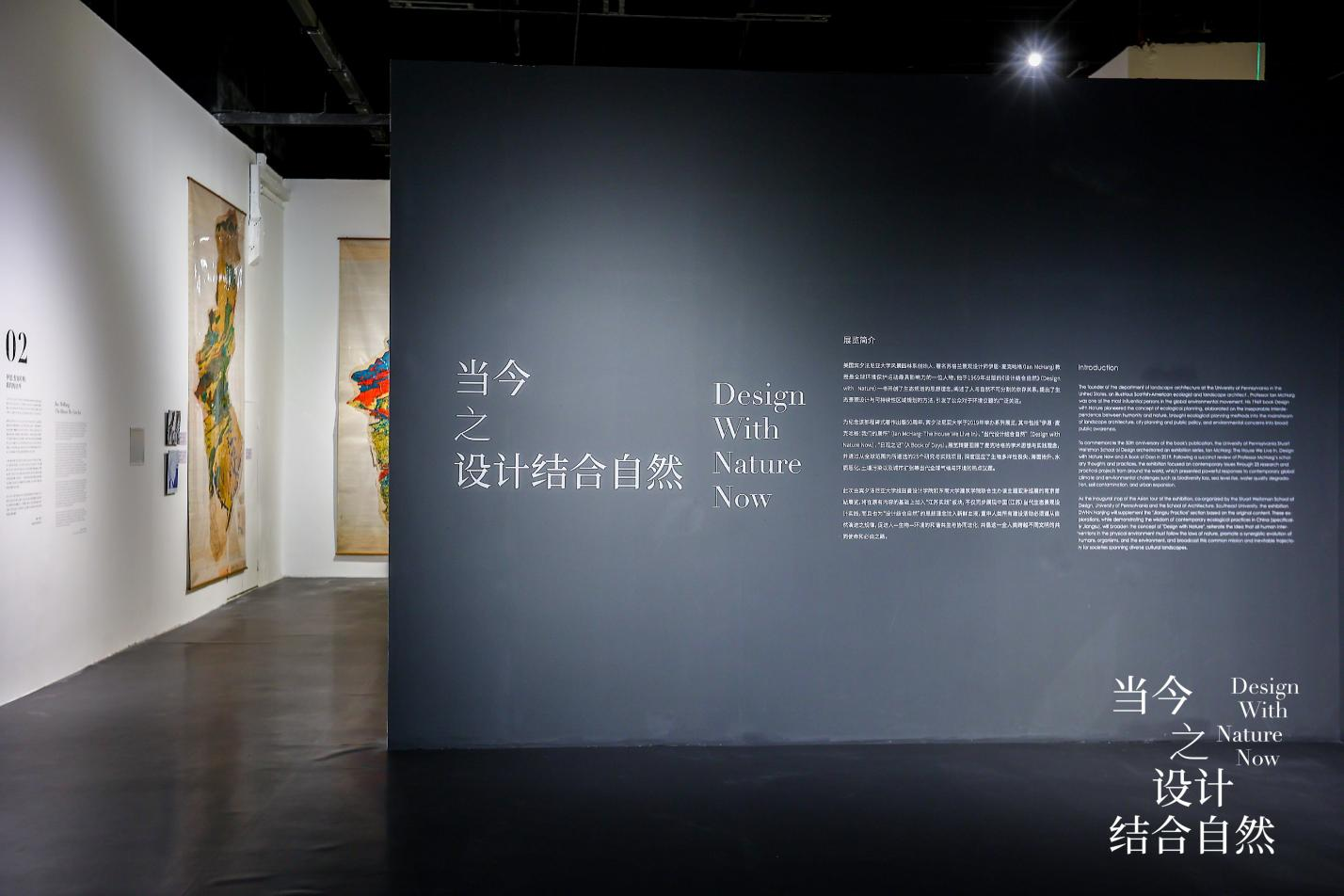
“當(dāng)今之設(shè)計結(jié)合自然”的亞洲巡展·南京首站照片
Photographs from the first stop in Nanjing of the Asia Tour Exhibition “Design with Nature Now”
活動主題 Theme
在不同職業(yè)領(lǐng)域和學(xué)術(shù)門類中,傳統(tǒng)意義上對人工世界與自然世界的簡單而絕對的劃分,已經(jīng)很難令人信服。截然兩分的認知方式被完全摒棄。例如,生態(tài)學(xué)作為曾經(jīng)研究自然棲息地的科學(xué),將其研究范圍擴展到人類相關(guān),比如文化;另一方面,人類學(xué)和人文學(xué)科卻又越來越“環(huán)境化”,通常被認為屬于設(shè)計藝術(shù)的城市設(shè)計,則已然把對景觀的設(shè)計和理解當(dāng)作自己的核心命題。我們呼吸的空氣、飲用的水、食用的食物以及居住的景觀,無不是人工的產(chǎn)物。那種關(guān)于存在一個原始而透明的自然的舊有觀念,已是一場夢境的終曲。
Across the spectrum of contemporary professions and academic disciplines, the age-old categorical distinction between dimensions of the world that have come into being through one or another of the arts and those that have not is becoming less and less plausible. In many cases, the distinction is simply rejected. Ecology, for example, once a science of natural habitats, has extended its proper subject matter to include human affairs, which is to say culture, just as anthropology and the humanities have become environmental, and a design art like urbanism has become a matter of landscape design and understanding. The air we breathe, the water we drink, the food we eat, and the landscapes we inhabit are outcomes of human making. The old notion of pristine nature is a dream dreamt out.
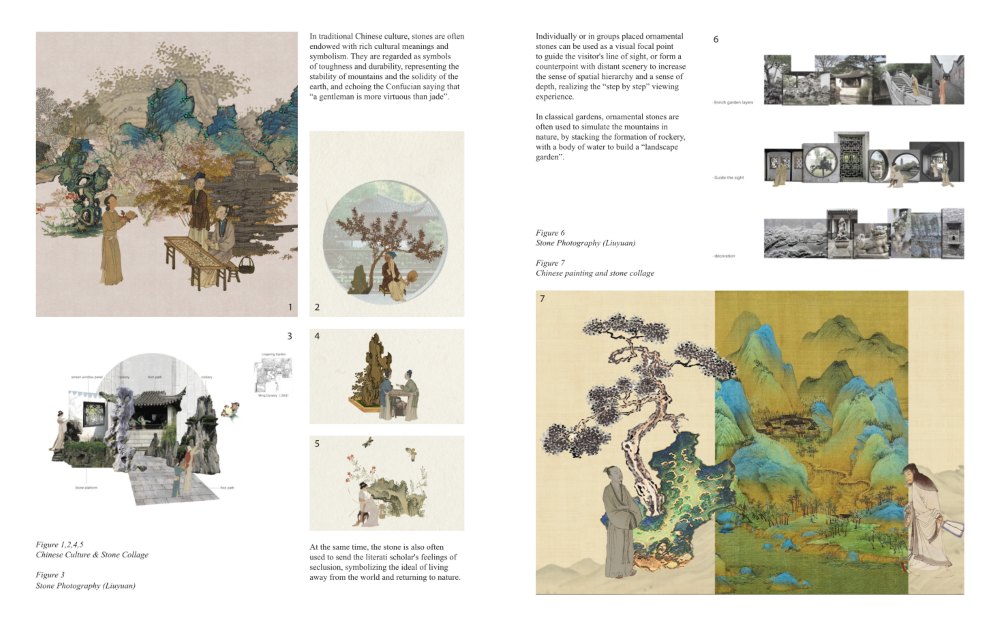
BEYOND STONE:Crossing Material Boundaries
2024年的暑期學(xué)校,東南大學(xué)和賓夕法尼亞大學(xué)的青年學(xué)子交叉組隊,形成十個研學(xué)小組,參與了以工作坊形式展開的一系列學(xué)術(shù)活動。旨在通過對幾個中國城市中經(jīng)過精心挑選的建筑、景觀和城市設(shè)計作品的記錄和解讀,讓同學(xué)們思考和跟進這些前沿觀念。它們或許激進,但卻反映和代表了新的趨勢。中美學(xué)生走進南京、上海、蘇州、揚州等中國城市,對代表性的建筑、景觀和城市設(shè)計作品進行調(diào)研、記錄和解讀,對相關(guān)前沿理念開展研討。通過親身考察,以自己的視角記錄與研讀,深入理解這些典范性項目,共同研討生態(tài)環(huán)境可持續(xù)發(fā)展的全球議題與設(shè)計實踐。
In the summer of 2024, students from Southeast University and the University of Pennsylvania will form ten interdisciplinary research teams to participate in a series of workshops. The goal is to engage with cutting-edge concepts by documenting and interpreting selected architectural, landscape, and urban design projects in Nanjing, Shanghai, Suzhou, and Yangzhou. These projects, while potentially radical, reflect emerging trends. By conducting field investigations and analyzing these exemplary projects, students will gain a deep understanding of the designs and discuss global issues and sustainable ecological development practices.
活動成果 Outcomes
如何“跨越人工與自然的對立”?暑假學(xué)校的最終成果從5個方面給予了探索性回答,
1. 考慮項目的建造:取自現(xiàn)場的本地材料和在外地生產(chǎn)或制造后帶到此地的材料,它們之間是什么關(guān)系(如連接形式或連接點)?
2. 考慮項目的使用模式:設(shè)計所預(yù)期的人類行為和場景體驗,如何通過周圍的環(huán)境條件得到維持和延續(xù)?
3. 考慮項目的空間布局:設(shè)計中的哪些元素和部位,揭示了設(shè)計師對本地和遠地的事件及時間之間特定關(guān)系的認知?
4. 考慮項目形式、外觀和用途的整體一致性:哪些具體跡象表明建筑、景觀和城市設(shè)計之間的邊界已然模糊?
5. 考慮項目需要應(yīng)對的當(dāng)代現(xiàn)實與其場地既有環(huán)境之間的關(guān)系:設(shè)計中的哪些地方、形式和細節(jié),展示了其對歷史狀況或先在條件的創(chuàng)造性轉(zhuǎn)化?
How can we "overcome the opposition between artifice and nature"? The outcomes of the summer school provided exploratory answers from five topics:
1. Considering the construction of a project, what are the relationships (joints or forms of connection) between materials that are local to the work and those that have been brought there after being produced or manufactured elsewhere?
2. Considering the patterns of use accommodated by the project, how are the forms of human behavior and experience intended by the design sustained and enriched by ambient environmental conditions?
3. Considering the spatial arrangements of the project, which elements and places of the design indicate the designer’s awareness of specific relationships between local and remote phenomena and occurrences?
4. Considering the overall coherence of the project’s form, appearance, and uses, what are some of the specific indications of a non-distinction between architecture, landscape architecture, and urban design?
5. Considering the relationship between the project’s contemporary reality and the historical precedents that define its location, what are the places, forms, and details of the design that show the creative transformation of historical or pre-existing conditions?
01. THE CONSTRUCTION
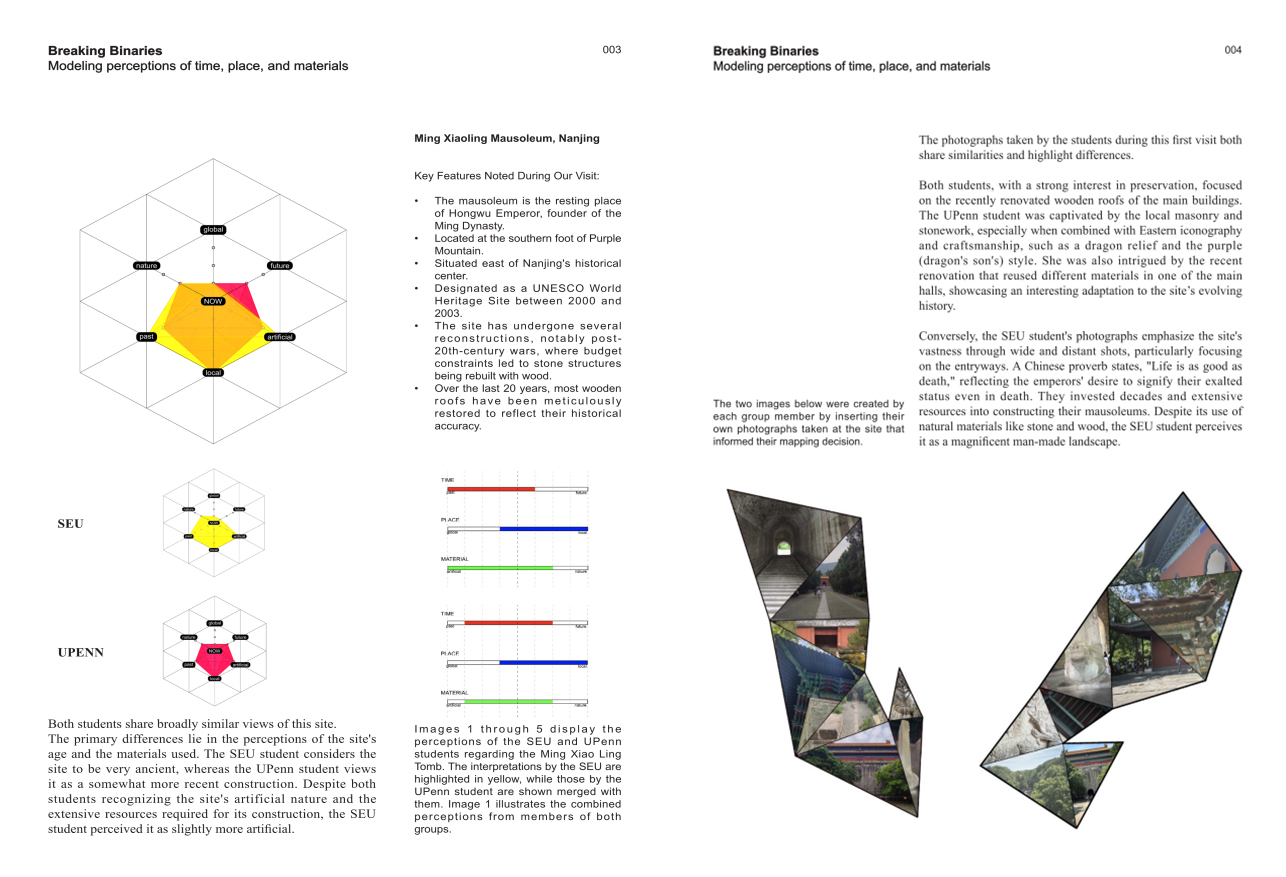
BREAKING BINARIES: Modeling Perception of Time, Place, and Materials
團隊旨在探索東西方對建筑和自然環(huán)境的不同理解。通過創(chuàng)建三維模型,比較了學(xué)生們對虎丘、拙政園和明孝陵等名勝的解讀。結(jié)果顯示,學(xué)生們對這些地點的看法存在顯著差異。此研究方法有效促進了跨文化對話,打破了傳統(tǒng)的二元對立思維。
The team aimed to explore the differing understandings of architecture and the natural environment between Eastern and Western students. By creating 3D models, they compared students' interpretations of famous sites such as Tiger Hill, the Humble Administrator's Garden, and the Ming Xiaoling Mausoleum. The results showed significant differences in students' perceptions of these locations. This research method effectively promoted cross-cultural dialogue, breaking down traditional binary oppositional thinking.
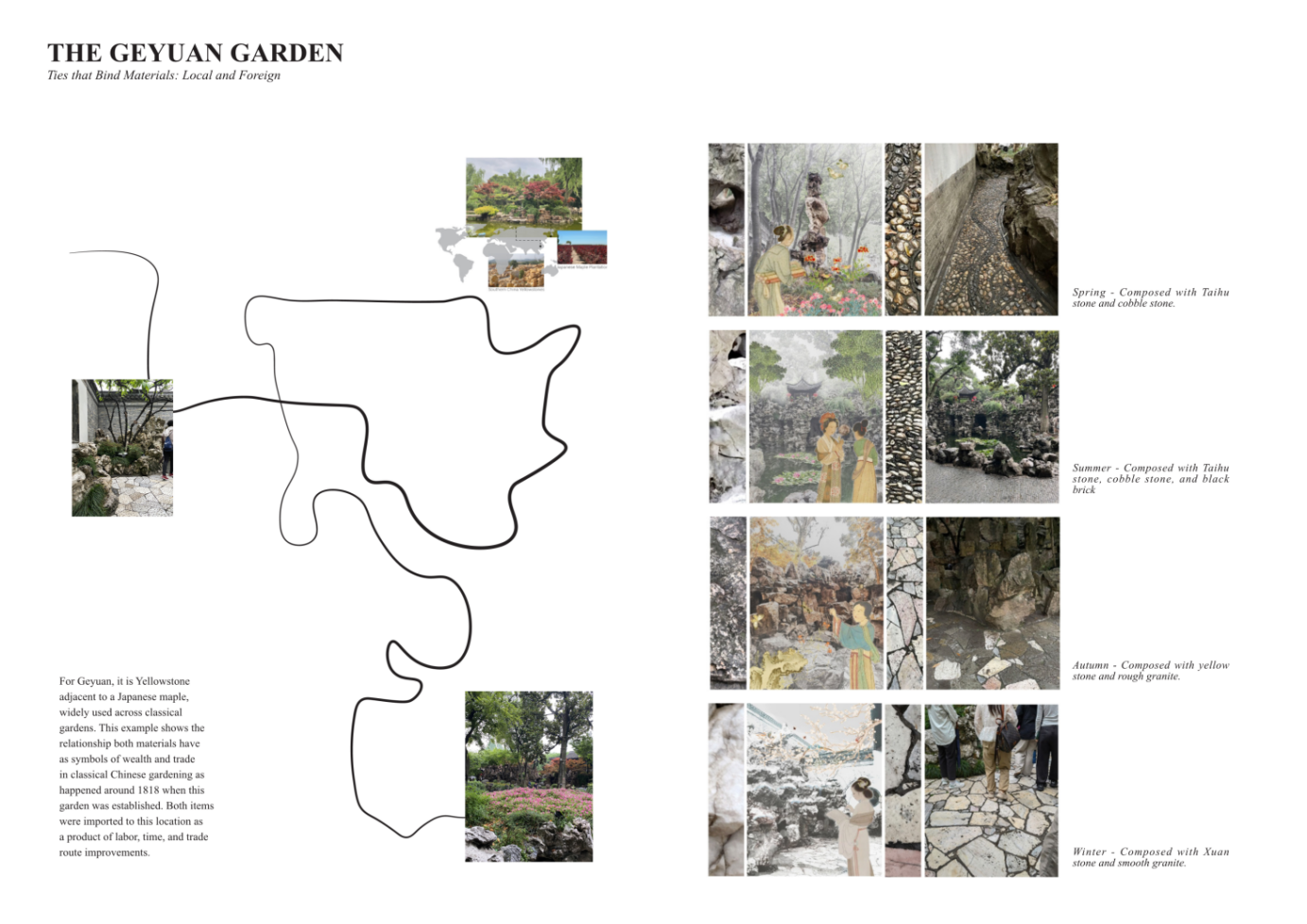
BEYOND STONE: Crossing Material Boundaries
團隊探討了中國古今園林中石頭的應(yīng)用及其文化意義,詳細分析了石頭在園林設(shè)計中的多種用途,并指出石頭應(yīng)用中的生態(tài)可持續(xù)性、材料多樣性以及文化創(chuàng)新,體現(xiàn)了對自然美和文化遺產(chǎn)的持續(xù)追求。
The team explored the application and cultural significance of stones in Chinese gardens, both ancient and modern. They conducted a detailed analysis of the various uses of stones in garden design, highlighting ecological sustainability, material diversity, and cultural innovation in their application. This reflects a continued pursuit of natural beauty and cultural heritage.
02. THE PATTERNS OF USE
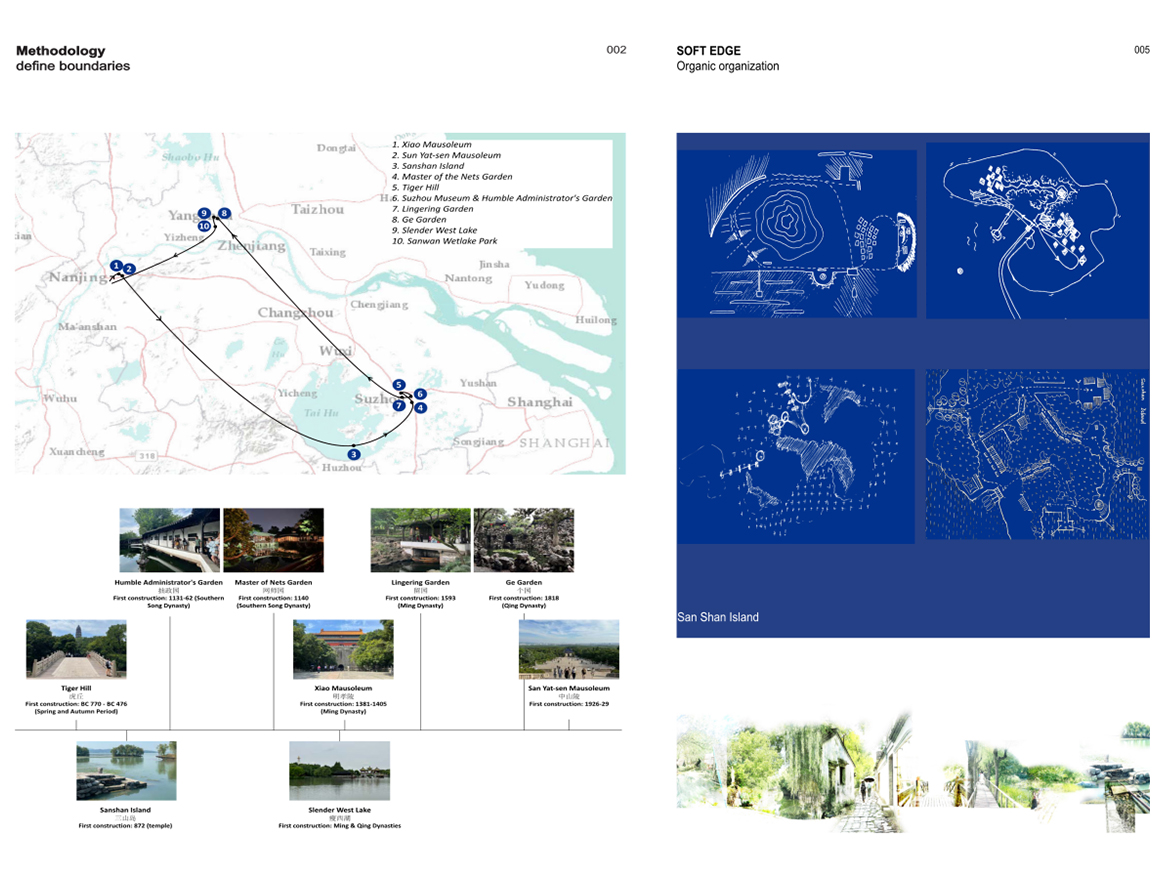
DIFFUSED BOUNDARIES: Experiential study of Interactions between the artificial and natural
團隊從物形、文化和感官三個層面剖析了邊界的特性和人們與邊界的互動方式,揭示了邊界在建筑設(shè)計中的重要性。模糊的邊界能激發(fā)人們探索新地點并觀察變化,從而更深刻地認識到自己與自然的緊密聯(lián)系。
The team analyzed the characteristics of boundaries and people's interactions with them from three perspectives: physical, cultural, and sensory. They revealed the importance of boundaries in architectural design. Blurred boundaries can inspire people to explore new places and observe changes, leading to a deeper understanding of their close connection with nature.
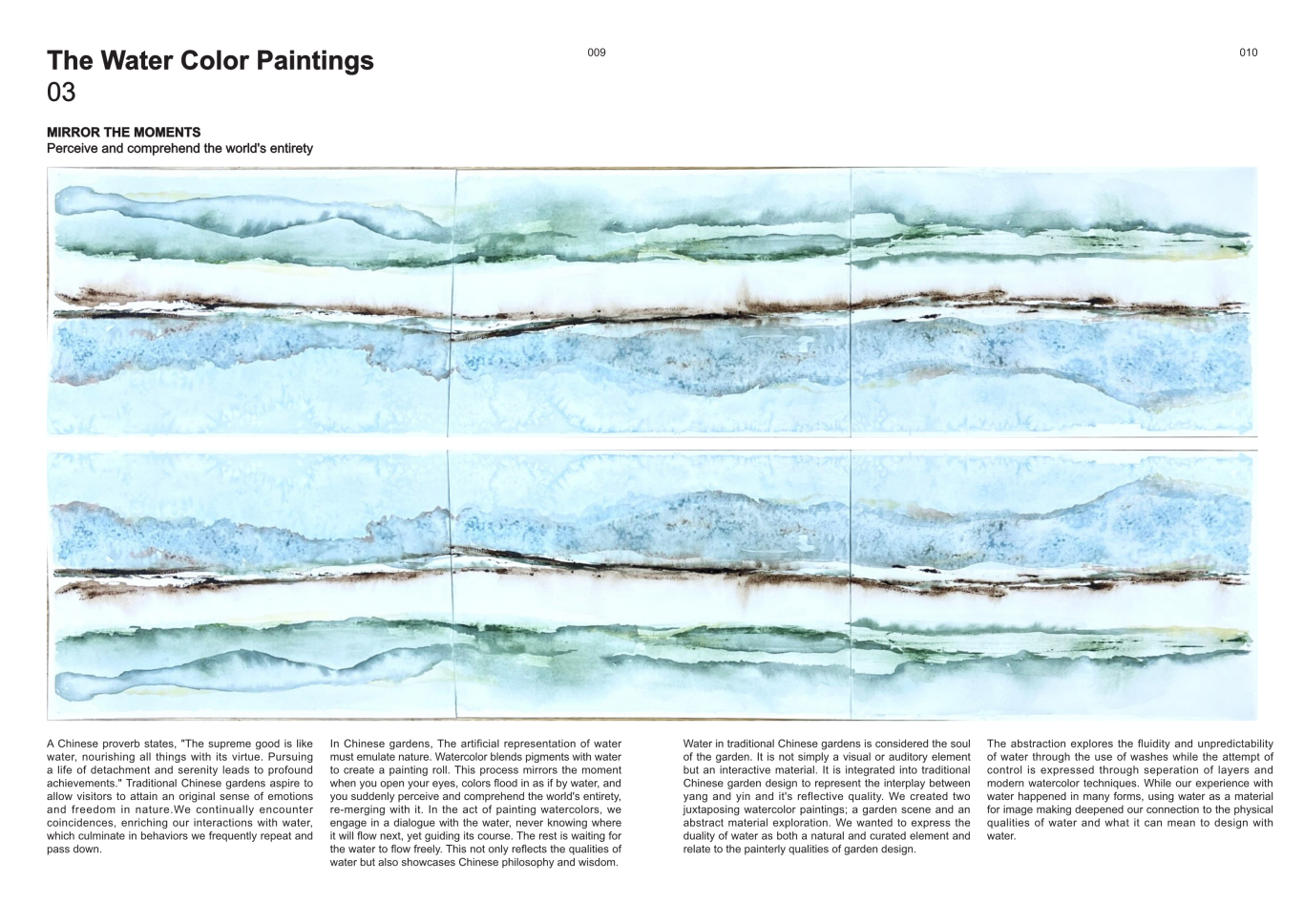
WATER IS LIFE: Jiangnan Waterscape Expo
團隊探索了中國“山水”藝術(shù)風(fēng)格,聚焦于水與景觀的互動。無論是現(xiàn)代水景還是傳統(tǒng)園林中的水元素,都承載著深厚的文化與自然意義。團隊還通過藝術(shù)創(chuàng)作表達了水帶給人們的情感體驗,強調(diào)水作為生命之源的重要性。
The team explored the Chinese "Shan Shui" (landscape) art style, focusing on the interaction between water and the landscape. Both modern water features and traditional garden water elements carry profound cultural and natural significance. Through artistic creations, the team expressed the emotional experiences water brings to people, emphasizing its importance as the source of life.
03. THE SPATIAL ARRANGEMENT

FROM HERE TO THERE: Distant Attraction
團隊聚焦于人類與自然互動的設(shè)計策略,通過“借景互動”理念,探討設(shè)計師如何精心策劃人與自然交流的時刻;分析空間序列與層次深度,揭示互動點的具體體現(xiàn),以及歷史與現(xiàn)狀的對比,深入探索園林設(shè)計的深層意義。
The team focused on design strategies for human interaction with nature through the concept of "borrowed scenery interaction." They explored how designers meticulously plan moments of interaction between people and nature, analyzing spatial sequences and depth to reveal specific instances of interaction. The team also contrasted historical and contemporary examples to deeply explore the profound meanings of garden design.
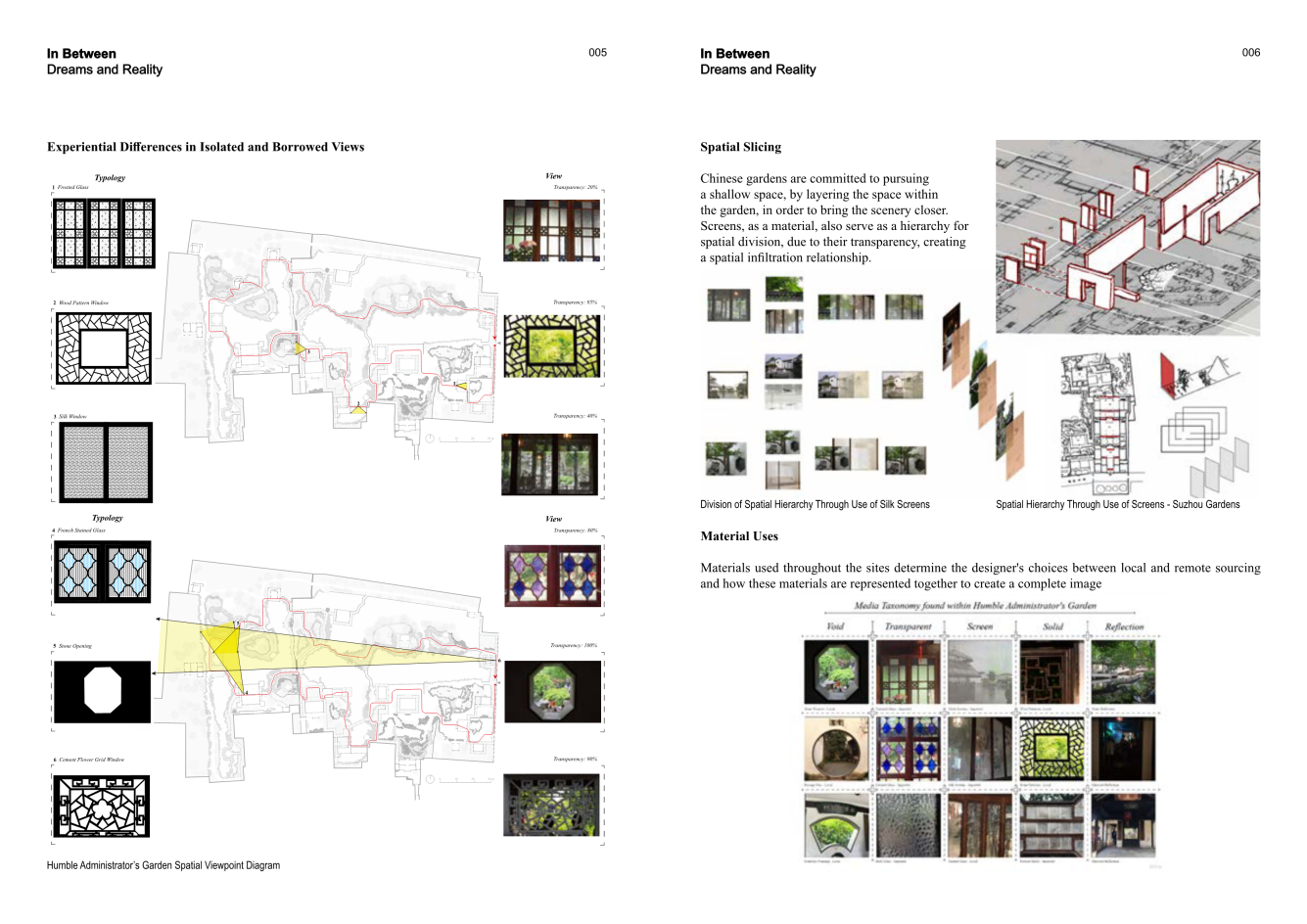
IN BETWEEN: Dreams and Reality
團隊以拙政園為例,探討了園林如何通窗戶、屏風(fēng)等元素的運用,實現(xiàn)空間的切割與視覺的框定;從而引導(dǎo)觀者聚焦于每一細節(jié)之美,將情感融入設(shè)計,激發(fā)觀者的想象力與創(chuàng)造力。
Using the Humble Administrator's Garden as an example, the team explored how gardens utilize elements such as windows and screens to achieve spatial segmentation and visual framing. This guides viewers to focus on the beauty of each detail, integrating emotion into the design and inspiring the viewers' imagination and creativity.
04. THE OVERALL COHERENCE OF THE PROJECT‘S FORM, APPEARANCE, AND USES
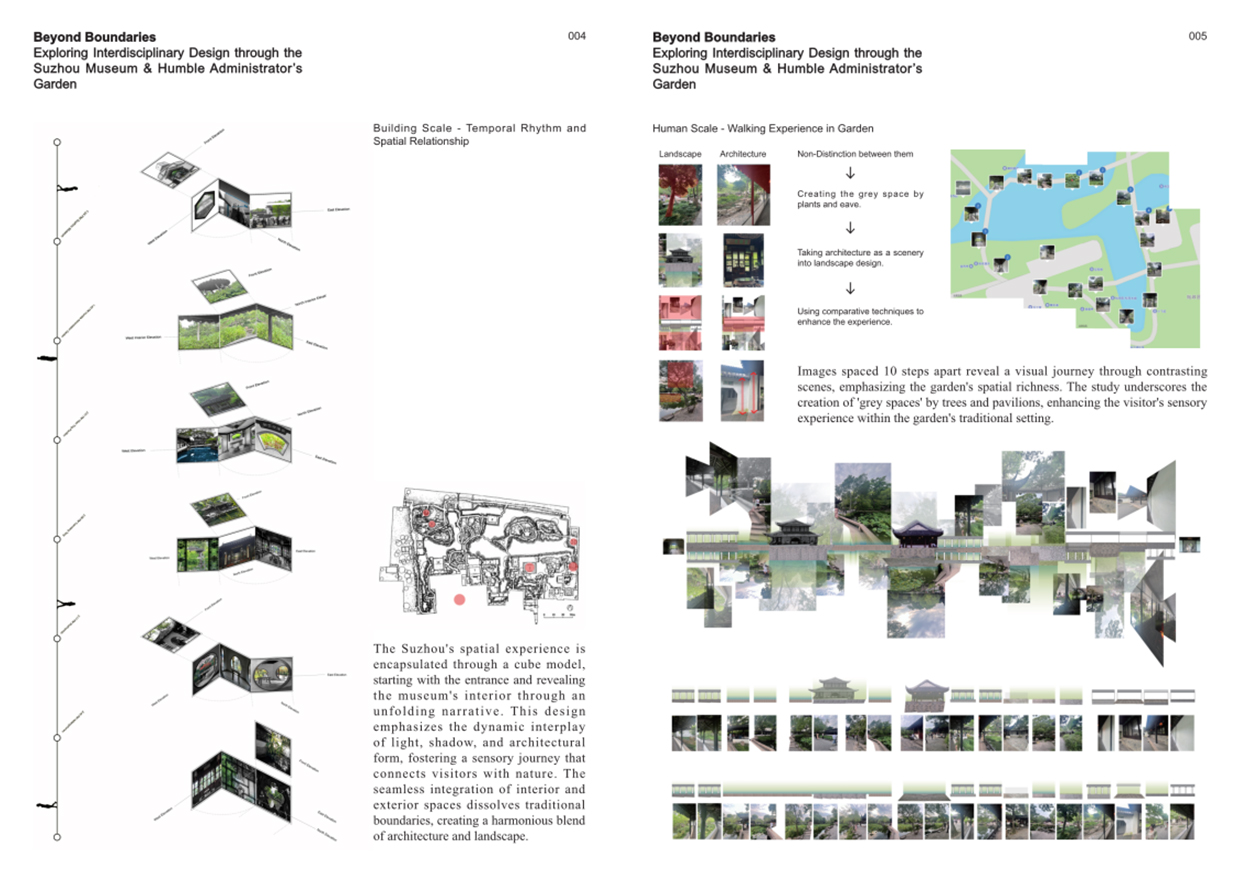
BEYOND BOUNDARIES: Between Artifice and Nature
團隊通過多尺度的分析,從場地規(guī)劃到建筑細節(jié),再到街道和鄰里環(huán)境,揭示了自然元素與人類體驗在塑造和諧空間中的核心作用;強調(diào)了學(xué)科之間的內(nèi)在聯(lián)系,為跨學(xué)科設(shè)計提供了新的視角和靈感。
Through multi-scale analysis, the team revealed the core role of natural elements and human experience in shaping harmonious spaces, from site planning to architectural details and neighborhood environments. They emphasized the intrinsic connections between disciplines, offering new perspectives and inspiration for interdisciplinary design.
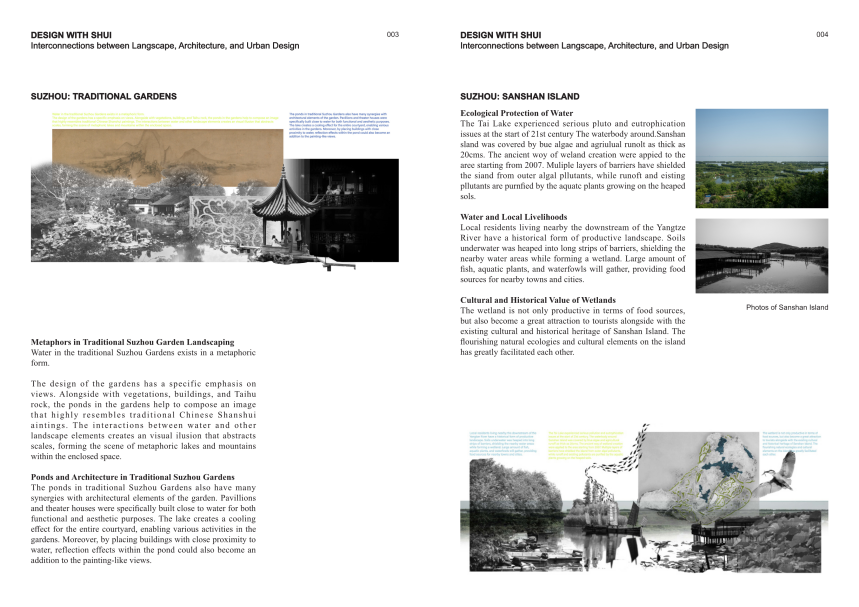
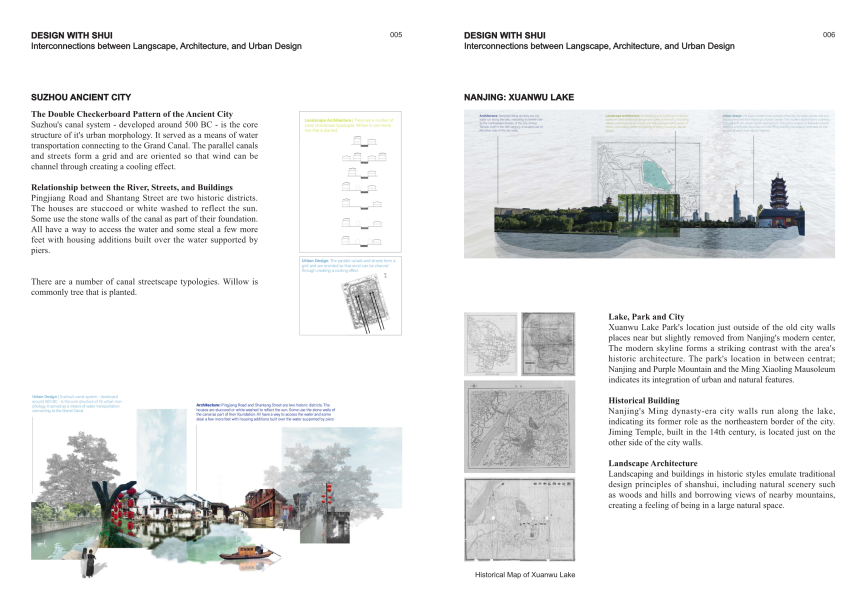
DESIGN WITH SHUI: EXPLORING THE INTERCONNECTIONS BETWEEN LANDSCAPE, ARCHITECTURE, AND URBAN DESIGN
團隊聚焦于中國傳統(tǒng)與現(xiàn)代景觀設(shè)計中水的角色與影響,探討其與建筑、景觀及城市設(shè)計的緊密關(guān)系,以及在現(xiàn)代城市設(shè)計中如何塑造空間、增強生態(tài)聯(lián)系;同時強調(diào)了水在中國經(jīng)濟文化發(fā)展中的重要作用。
The team focused on the role and impact of water in traditional and modern Chinese landscape design, exploring its close relationship with architecture, landscape, and urban design. They examined how water shapes spaces and enhances ecological connections in modern urban design, while also emphasizing its significant role in China's economic and cultural development.
05. THE RELATIONSHIP BETWEEN THE PROJECT’S CONTEMPORARY REALITY AND THE HISTORICAL PRECEDENTS
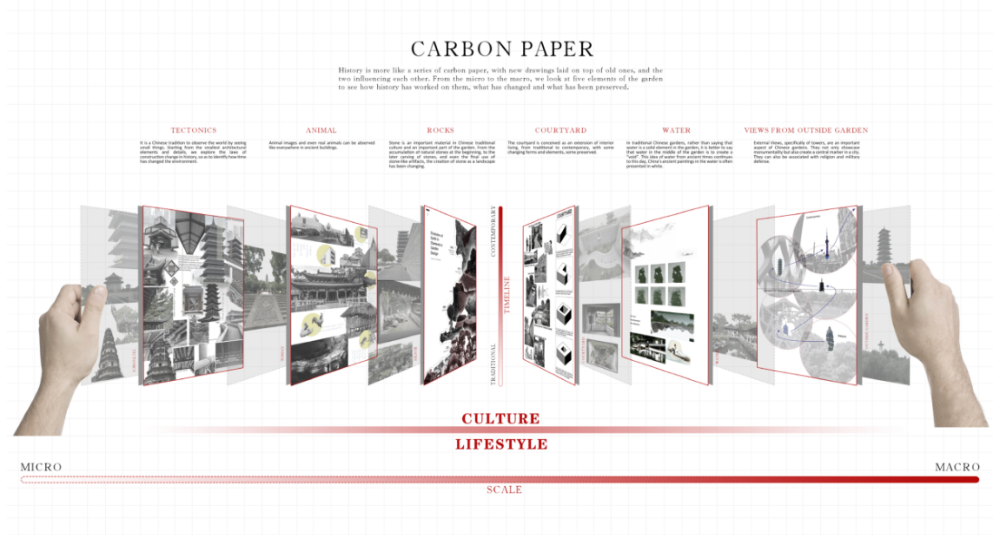
WHEN HISTORY MEETS HISTORY: The Transformation of Elements in Historic Chinese Gardens
團隊通過分析結(jié)構(gòu)、材料與活動三個維度,探討傳統(tǒng)與現(xiàn)代如何在建筑設(shè)計中和諧共存。團隊挖掘了自然元素與動物意象在建筑中的獨特作用;庭院如何延續(xù)傳統(tǒng)并適應(yīng)現(xiàn)代生活;以及承載歷史的意義外部景觀,如塔,如何成為城市新焦點。
The team explored how tradition and modernity coexist harmoniously in architectural design by analyzing three dimensions: structure, materials, and activities. They investigated the unique role of natural elements and animal imagery in architecture, how courtyards can preserve tradition while adapting to modern life, and how historically significant external landscapes, such as towers, can become new urban focal points.
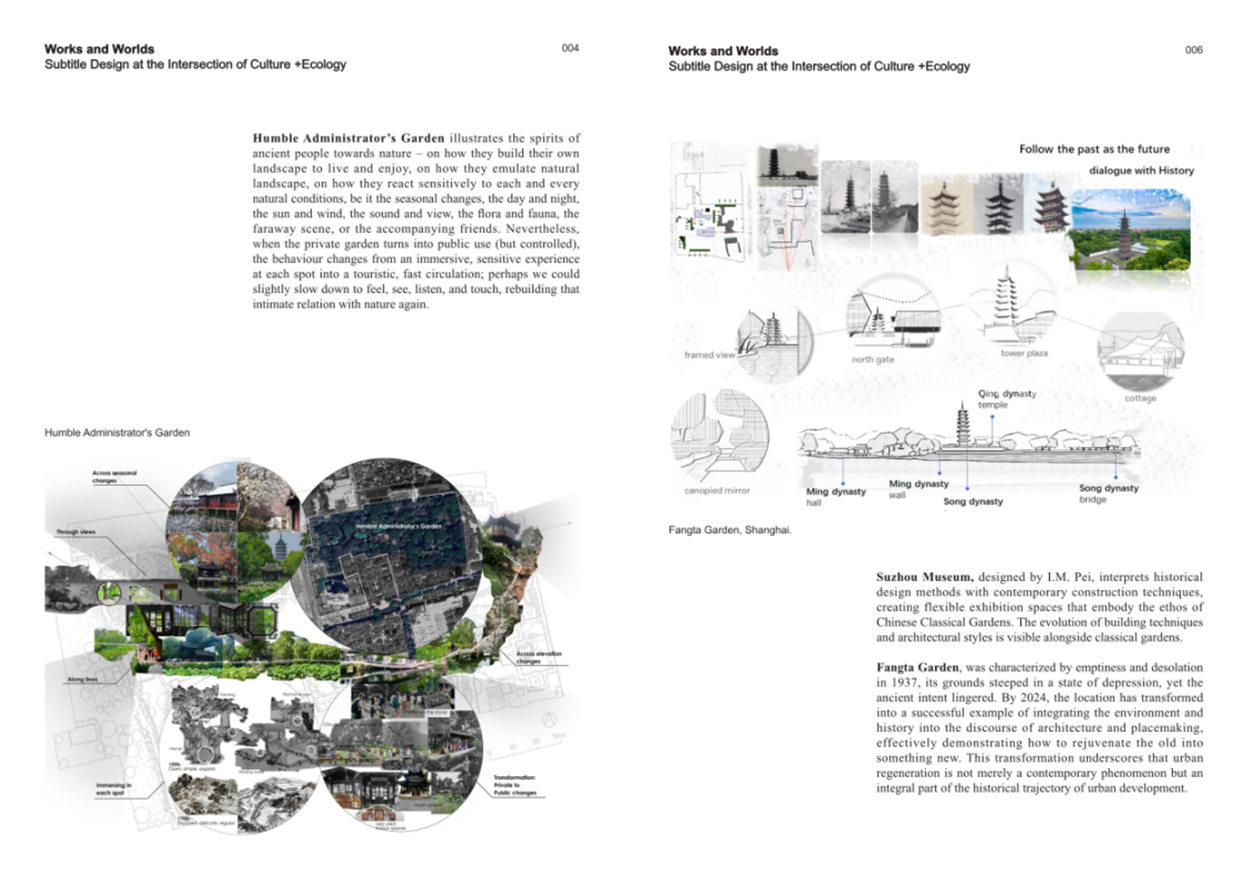
WORKS AND WORLDS: Design at the Intersection of Culture + Ecology
設(shè)計空間不僅是建筑師理念和原則的體現(xiàn),也是與周圍環(huán)境互動的結(jié)果。團隊通過蘇州博物館、拙政園、方塔園、三山島等案例,展現(xiàn)了從人類中心主義到強調(diào)生態(tài)修復(fù)和文化保護并重的轉(zhuǎn)變,洞察人類如何與自然和諧共存。
Designing space is not only a reflection of architects' concepts and principles but also a result of interaction with the surrounding environment. Through case studies such as the Suzhou Museum, the Humble Administrator's Garden, Fangta Park, and Sanshan Island, the team showcased the shift from anthropocentrism to a balanced emphasis on ecological restoration and cultural preservation, providing insights into how humans can coexist harmoniously with nature.
結(jié)語 Conclusion
舊有的兩分思維雖與今天越發(fā)無關(guān),但因其根深蒂固,甚難克服。改變這種狀況最好從起點處開始,這也成為工作坊的一個前提性認識:學(xué)生們通過親身考察,以自己的視角去記錄和研讀,來深入理解這些典范性項目。簡言之,工作坊是一個調(diào)動全部身心的研繪練習(xí),重新思考人工與自然之間的二元區(qū)分。
Well-established but increasingly less relevant habits of thought are not easily overcome. A premise of the Workshop is that it is best to begin at the beginning: how designers understand exemplary projects by recording and interpreting what they see—and see for themselves. The Workshop, in short, is an exercise in surveying.
Director:
Tong Zhang, Fredrick Steiner
Academic Advisors:
David Leatherbarrow
Coordinators:
Zhongjie Lin, Yonggao Shi
Instructors:
Southeast University: Jun Cao, Gaochao Zhang, Tao Shou, Yipeng Wang, Chu Chu, Lin Wang
University of Pennsylvania: Yadan Luo
Students:
BREAKING BINARIES: Modeling Perception of Time, Place, and Materials
Southeast University: Qianwen Ding, Qianhui Wang, Haoning Li, Huiying Zhan
University of Pennsylvania: Carlotta de Bellis, Gianna Paglia, Robert Levinthal
BEYOND STONE: Crossing Material Boundaries
Southeast University: Yilun Cao, Feiyu Zhao, Yuzhen Liu, Hongbu Wang
University of Pennsylvania: Anne Parker, Cate Orchard, Zihan (Henry) Wei
DIFFUSED BOUNDARIES: Experiential study of Interactions between the artificial and natural
Southeast University: Xin Du, Ruizhe Wang, Ye Tang, Mengyao Zhang
University of Pennsylvania: Andreina Sojo Faria, Clarasophia Gust, Siyu (Jasmine) Wu
WATER IS LIFE: Jiangnan Waterscape Expo
Southeast University: Yanxiang Yang, Shuyao Ren, Sijia Fan
University of Pennsylvania: Alexandra Hayes, Jesus Frias, Rachel Aaronson, Sierra Caley
FROM HERE TO THERE: Distant Attraction
Southeast University: Rongqian Qiu, Yuhao Cheng, Yinan Chen, Zihao Dai
University of Pennsylvania: Charles Starks, Maria Fairchild, Brianna Belo
IN BETWEEN: Dreams and Reality
Southeast University: Yi He, Yiting Wu, Yunshu Yang
University of Pennsylvania: Anwen Kelly, Brenton Cai, Courtney Ward, Yalei Zhu
BEYOND BOUNDARIES: Between Artifice and Nature
Southeast University: Zhen Lei, Lingzhi Xu, Zixuan Aisin Gioro
University of Pennsylvania: Alexa Ringer, Jordan Arden, Julius Quartey-Papafio, Lillian Zhang
DESIGN WITH SHUI: EXPLORING THE INTERCONNECTIONS BETWEEN LANDSCAPE, ARCHITECTURE, AND URBAN DESIGN
Southeast University: Yan Peng, Yuning Zhuang, Yunlong Liu
University of Pennsylvania: Chesa Wang, Lahy Amman, Miranda Ayres, Ruby Nwaebube, Jichu Zhang
Acknowledgements:
Suzhou Municipal People's Government
Yangzhou Municipal People's Government
Sun Yat-sen Mausoleum Administration Bureau
Jinling STYLE
Jiangsu Zhusen Architecture Design Co., LTD
發(fā)文編輯|吳秀秀
審核編輯|二宏,Yibo
專欄編輯 | Sherry Li
網(wǎng)站審核|吳秀秀
版權(quán)?建道筑格ArchiDogs,轉(zhuǎn)載請聯(lián)系media@archidogs.com
若有涉及任何版權(quán)問題,請聯(lián)系media@archidogs.com,我們將盡快妥善處理。

